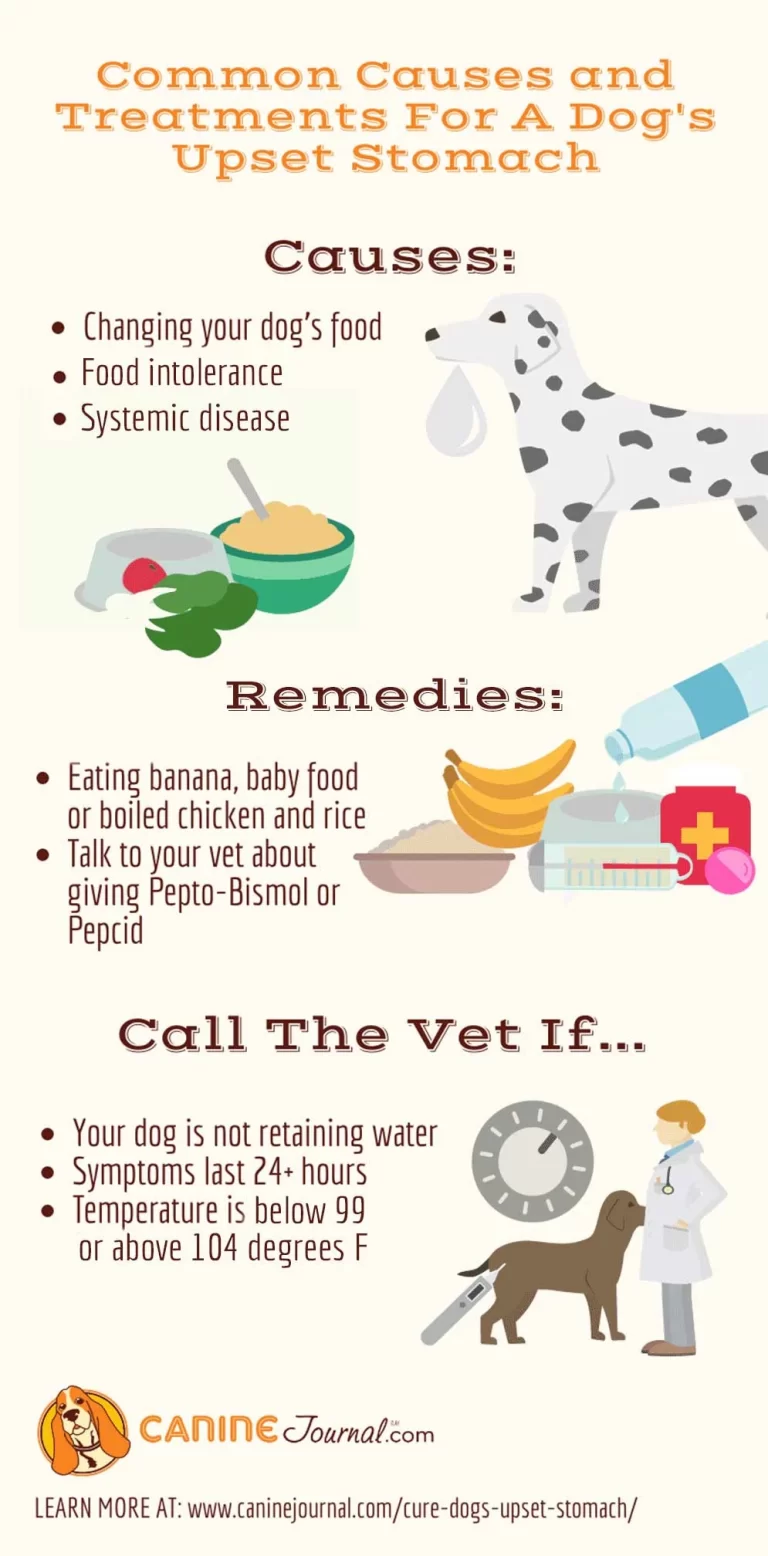To settle your dog’s stomach, give him a bland diet of boiled chicken and rice. If your dog is experiencing stomach upset, a common remedy is to provide a bland diet of boiled chicken and white rice.
This gentle and easily digestible meal helps to soothe the stomach and reduce irritation. It is important to avoid feeding your dog any rich or spicy foods and stick to this simple combination until their stomach settles. Additionally, make sure your dog has access to plenty of fresh water, as staying hydrated is crucial for recovery.
If the symptoms persist, it’s best to consult with a veterinarian to rule out any underlying health issues. Taking proactive steps to ensure your dog’s comfort and health is essential in maintaining their overall well-being.

Credit: www.caninejournal.com
Natural Remedies
Natural remedies can be a safe and effective way to settle your dog’s upset stomach. They are gentle on the digestive system and provide much-needed relief. Here are a few natural remedies that you can give your dog to help calm his upset stomach.
Homecooked Meals
If your dog has an upset stomach, a simple and easily digestible homecooked meal can work wonders. It’s important to stick to bland ingredients that are gentle on the stomach. Some great options include boiled chicken breast, white rice, and sweet potatoes. These ingredients are not only easy to prepare but also provide much-needed nutrition for your furry friend.
Bone Broth
Bone broth is a nourishing and soothing remedy for dogs with upset stomachs. It is filled with essential nutrients and can help to rehydrate your dog. Bone broth is packed with collagen and gelatin, which can support gut health and reduce inflammation. To make bone broth, simply simmer bones in water for several hours until they release their beneficial compounds. The result is a nutritious and delicious broth that your dog will love.
Over-the-counter Medications
When your dog is experiencing stomach upset, you may consider over-the-counter medications to help alleviate their discomfort. It’s important to use medications specifically designed for dogs and to consult with a veterinarian before administering any new treatments.
Anti-nausea Medications
Anti-nausea medications can help reduce your dog’s discomfort by suppressing nausea and vomiting. However, it’s crucial to use medications that are safe for dogs and follow the recommended dosage. Common anti-nausea medications for dogs include diphenhydramine, mirtazapine, and maropitant citrate. Always consult with a veterinarian before giving your dog any over-the-counter medications.
Digestive Enzymes
Digestive enzymes can aid in the digestion of food, potentially easing your dog’s stomach discomfort. These enzymes help break down food into nutrients, which may be helpful for dogs with digestive issues. When selecting digestive enzymes for your dog, look for products that are specifically formulated for canines and consult with a veterinarian to determine the appropriate dosage.
Herbal Supplements
`Herbal supplements can be a gentle and effective way to settle your dog’s upset stomach. Peppermint and ginger are two herbal remedies that are commonly used to soothe digestive issues in dogs. These natural ingredients can help alleviate symptoms such as nausea, bloating, and indigestion, providing relief for your furry friend. Let’s explore the benefits of these herbs and how you can incorporate them into your dog’s diet.
`peppermint`
`Peppermint is known for its calming properties, which can help relax the muscles of the digestive tract and reduce stomach discomfort in dogs. Its soothing effect can ease gastrointestinal upset and promote better digestion. You can offer your dog peppermint tea or add a few drops of peppermint oil to his water or food. However, it’s important to use caution with peppermint oil, as it can be potent and should be diluted properly before giving it to your dog.
`ginger`
`Ginger has been used for centuries as a natural remedy for digestive issues in both humans and dogs. It contains compounds that help reduce inflammation and alleviate nausea. You can give your dog small amounts of fresh ginger, grated and added to his meals, or opt for ginger supplements specifically formulated for dogs. Additionally, ginger can be brewed into a tea to calm your dog’s stomach and provide relief from indigestion.
Probiotics
Looking to settle your dog’s upset stomach? Consider giving him probiotics, which are known to promote digestive health and relieve gastrointestinal discomfort in dogs. With their beneficial bacteria, probiotics can help restore balance and promote overall gut health in your furry friend.
Introduction To Probiotics
Probiotics are living microorganisms that provide health benefits when consumed in adequate amounts, especially for digestive health. These beneficial bacteria promote a balanced gut environment by improving the composition of the gut flora. Dogs, like humans, can benefit from probiotics to settle their stomachs and alleviate digestive issues.Best Probiotic Supplements For Dogs
There are several probiotic supplements available in the market that can help settle your dog’s stomach. These supplements come in various forms such as powders, tablets, and capsules. Here are some of the best probiotic supplements for dogs: 1. Probiotic Powder: This type of probiotic supplement is easy to administer by simply mixing it with your dog’s regular food. Look for products that contain a blend of different probiotic strains, including species like Lactobacillus and Bifidobacterium. These can help restore the balance of beneficial bacteria in your dog’s gut. 2. Probiotic Tablets: If your dog is a picky eater and doesn’t readily accept powder supplements, probiotic tablets are a convenient alternative. These tablets often have a tasty flavor that appeals to dogs, making them more likely to consume it without fuss. 3. Probiotic Capsules: Capsules are another option for providing probiotics to dogs. They are easy to administer as you can open the capsule and sprinkle the contents onto your dog’s food. Make sure to choose a product with a high colony-forming unit (CFU) count to ensure the effectiveness of the probiotics. 4. Probiotics in Treats: For dogs who love treats, there are probiotic-infused options available. These treats not only provide the benefits of probiotics but also serve as a tasty reward for your furry friend. When choosing a probiotic supplement for your dog, it’s essential to select a reputable brand that uses quality ingredients and has a good track record. Consult with your veterinarian to determine the appropriate probiotic strain and dosage for your dog’s specific needs. Remember, while probiotics can be beneficial for dogs with digestive issues, they are not a substitute for veterinary care. If your dog’s stomach problems persist or worsen, it’s important to seek professional advice to rule out any underlying health concerns. Incorporating probiotics into your dog’s routine can help promote a healthy gut and alleviate stomach discomfort. Consider adding a probiotic supplement to your dog’s diet under the guidance of your veterinarian for optimal digestive health.Preventative Measures
Preventing stomach issues in dogs requires a proactive approach. By implementing certain preventative measures such as a balanced diet and regular exercise, you can help keep your furry friend’s stomach healthy and happy.
Balanced Diet
A balanced diet is essential for maintaining your dog’s overall health, including their digestive system. Providing your dog with a diet that is rich in essential nutrients can promote a strong immune system and proper digestion.
To ensure a balanced diet for your dog, consider the following:
- Include high-quality protein sources, such as chicken, beef, or fish, to support muscle growth and repair.
- Include a variety of fruits and vegetables to provide essential vitamins, minerals, and fiber.
- Choose a dog food that is specifically formulated for your dog’s age, size, and breed.
- Avoid feeding your dog table scraps or foods that are high in fat, as these can cause gastrointestinal upset.
By following these tips and providing your dog with a well-balanced diet, you can help prevent stomach issues and promote their overall well-being.
Regular Exercise
Regular exercise is not only beneficial for your dog’s physical health but also plays a significant role in maintaining a healthy digestive system. Engaging your dog in regular physical activity helps to stimulate their metabolism, promote bowel movements, and prevent constipation.
Consider the following when it comes to exercising your furry companion:
- Take your dog for daily walks or runs to ensure they get enough exercise.
- Engage in interactive play, such as fetch or tug-of-war, to keep your dog physically and mentally stimulated.
- Provide your dog with toys or puzzles that promote active engagement and movement.
By incorporating regular exercise into your dog’s routine, you can help maintain their digestive health and prevent stomach issues.

Credit: www.facebook.com

Credit: www.petmd.com
Frequently Asked Questions On What Can I Give My Dog To Settle His Stomach
What Can I Give My Dog To Settle His Stomach?
You can try feeding your dog a bland diet of boiled chicken and rice to settle his stomach. Additionally, you can give him small amounts of plain yogurt or pumpkin puree, as they can help soothe his digestive system. It’s important to consult with your vet before trying any remedies.
Conclusion
There are several safe and natural remedies to settle your dog’s upset stomach. Whether it’s bland food options like rice and boiled chicken, or the addition of probiotics and digestive enzymes, you can help alleviate their discomfort. Remember to consult with your vet to determine the underlying cause and the best course of action.
By taking care of your furry friend’s stomach, you can ensure their overall health and happiness.



